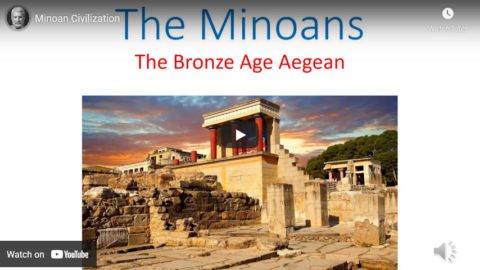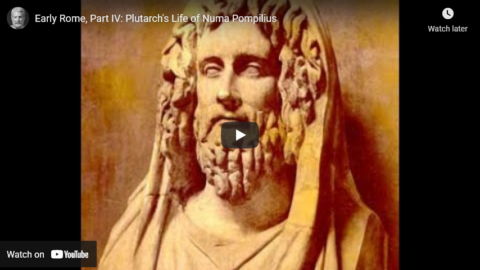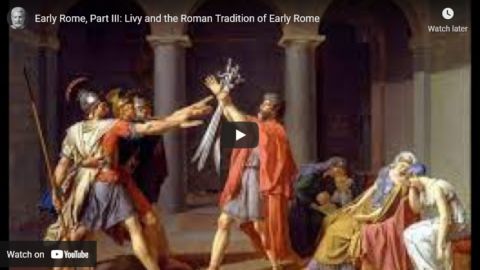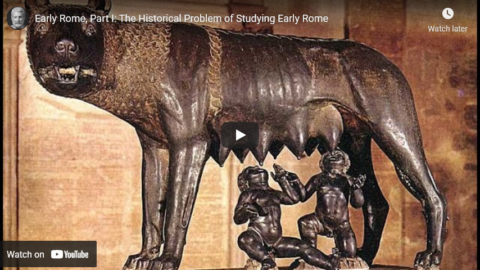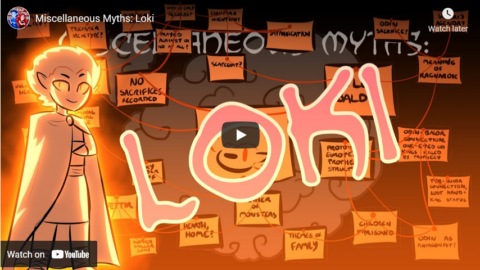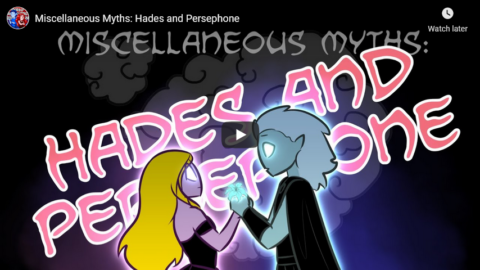Thersites the Historian
Published 25 Jan 2018In this video, I look at the Bronze Age civilization on Crete known as the Minoans.
December 14, 2021
Minoan Civilization
September 13, 2021
Early Rome, Part IV: Plutarch’s Life of Numa Pompilius
Thersites the Historian
Published 5 Sep 2021In this video, we look at how the philosopher Plutarch dealt with early Rome when he covered the life and times of Numa Pompilius, the most significant of Rome’s cultural heroes.
Patreon link: https://www.patreon.com/thersites
PayPal link: paypal.me/thersites
Discord: https://discord.gg/QCaXXFr
Brave Browser: https://brave.com/noa557
Twitter link: https://twitter.com/ThersitesAthens
Minds.com link: https://www.minds.com/ThersitestheHis…
Steemit/dtube link: https://steemit.com/@thersites/feed
BitChute: https://www.bitchute.com/channel/jbyg…
September 12, 2021
Early Rome, Part III: Livy and the Roman Tradition of Early Rome
Thersites the Historian
Published 5 Sep 2021Here, I examine Livy’s Book I with an emphasis on the tradition that he worked in and his agenda for undertaking such a massive and ambitious project.
Patreon link: https://www.patreon.com/thersites
PayPal link: paypal.me/thersites
Discord: https://discord.gg/QCaXXFr
Brave Browser: https://brave.com/noa557
Twitter link: https://twitter.com/ThersitesAthens
Minds.com link: https://www.minds.com/ThersitestheHis…
Steemit/dtube link: https://steemit.com/@thersites/feed
BitChute: https://www.bitchute.com/channel/jbyg…
September 7, 2021
Early Rome, Part II: Dionysius of Halicarnassus and the Greek Tradition of Early Rome
Thersites the Historian
Published 4 Sep 2021In this video, I provide an analysis of the opening sections of Dionysius of Halicarnassus’ History of Rome, discussing where his place in the historiographical tradition and the goal of his work.
Patreon link: https://www.patreon.com/thersites
PayPal link: paypal.me/thersites
Discord: https://discord.gg/QCaXXFr
Brave Browser: https://brave.com/noa557
Twitter link: https://twitter.com/ThersitesAthens
Minds.com link: https://www.minds.com/ThersitestheHis…
Steemit/dtube link: https://steemit.com/@thersites/feed
BitChute: https://www.bitchute.com/channel/jbyg…
September 6, 2021
Early Rome, Part I: The Historical Problem of Studying Early Rome
Thersites the Historian
Published 2 Sep 2021In this video, I discuss why early Rome is difficult to study and preview the upcoming episodes in this series.
Patreon link: https://www.patreon.com/thersites
PayPal link: paypal.me/thersites
Discord: https://discord.gg/QCaXXFr
Brave Browser: https://brave.com/noa557
Twitter link: https://twitter.com/ThersitesAthens
Minds.com link: https://www.minds.com/ThersitestheHis…
Steemit/dtube link: https://steemit.com/@thersites/feed
BitChute: https://www.bitchute.com/channel/jbyg…
July 16, 2021
QotD: Thebes
John Stuart Mill rated the Athenian triumph at Marathon as more important in English history than the battle of Hastings. Did he mention the almost immediate humiliation, by the Athenians, of their victorious general Miltiades? After his brilliant victory at Salamis, ten years later, Themistocles was banished from Athens and ended serving the Persians whose fleet he had destroyed. A tough house to play, old Hellas. The Athenians did the chat; the Spartans the silences. And Thebes? Supplied settings and plots, mostly in the form of awful warnings.
Paul Cartledge makes the case for a central historical role for Oedipus’s home town. As scholarly as he is revisionist, his handsomely garnished Thebes is neither freckled with footnotes nor fancy with Gibbonian phrases. The Thebans’ exceptional capacity for disastrous decisions begins in mythology with the rejection by king Pentheus of the androgynous divinity Dionysus, dramatised in Euripides’s Bacchae.
There followed the king’s death at the hands of his own raving, Bacchanalian mother and the seismic ruin of the city. Homosexuality has no place in Cartledge’s index, but Oedipus’s father Laius, mythical king of Thebes, is the first man said to have swung both ways. The Sacred Band, in classical times, was a select Theban formation of pairs of male lovers, all full citizens.
However gay ancient Hellenes were (not all that, some say, certainly not all), the Sacred Band’s reputation suggests that a zest of scandal accompanied its bravura. Sexual aberration was integral to their city’s fame. Oedipus’s inadvertent marriage with his own mother, Jocasta, led to the mutual slaughter of their sons, as well as to the refusal of his daughter Antigone to marry Haemon, the prince chosen for her by King Creon. Creon then walled her up, the original ochi (NO!) girl. It needed the Athenian Sophocles to make a play out of it. Modern Greeks celebrate ochi day every 28 October, anniversary of the date in 1941 when their dictator, Ioannis Metaxas, refused to surrender to Mussolini and so refurbished himself as a national hero.
Thebes and the confederation of Boeotian states it headed figured on no honours board during the fifth century BC, presumed, until recently, to be the Golden Age of ancient Hellas. When Xerxes marched into Greece in 480 BC, the Theban oligarchs took advice from the Delphic oracle — they may well have leaned on it first — and so had a divine excuse for not offering any obstacle to the barbarian invaders.
Half a century later, the Thebans’ levelling of plucky little Plataea, the Athenians’ sole ally at Marathon, was a lowlight of the Peloponnesian war. It was matched only by their vindictiveness after defeating an Athenian army (including infantryman Socrates and the subaltern Alcibiades) at Delium. They left the enemy dead to rot rather than hand over the bodies.
[…]
Mythical Thebans figure again and again in the work of the great Athenian dramatists, almost always as bad examples. The city and its neighbours may have originated political federation, but it produced no remarkable artist, no Demosthenic orator, no great dramatist. As far as the arts are concerned, Cartledge cites only Pronomus, the pied piper whose mastery of the aulos (not so much flute as “double-oboe”) won wide renown. Nostalgic seniors may recall Danny Kaye’s line, “The oboe, it is clearly understood / Is an ill-wind that nobody blows good.”
Thebes specialised in wrong turnings. During its two decades of ascendancy in the fourth century BC, it sought to keep Macedon in its place by holding the young Philip II hostage. Having learnt the military skills of his captors, the unforgiving outsider returned to chasten them. His son Alexander finished the job by literally flattening the city, save for the house of its greatest poet, Pindar, and the temples of gods whose favours he hoped to enjoy when he set off to purge and pillage the Persians. No second Pindar hymned his conquests; the Greeks never took him for one of their own. His death in his early thirties prompted an immediate rebellion against Macedonian dominion.
Frederic Raphael, “Thick as Thebans”, The Critic, 2021-03-25.
June 8, 2021
History Summarized: Ancient Egypt
Overly Sarcastic Productions
Published 3 Feb 2017This video was commissioned by our loyal Patron Karl Erik L. Hoftaniska! To become our Patron and get access to sweet rewards, hop on over to PATREON.COM/OSP
I must say, I was pleasantly surprised about the things I learned about Egypt in the process of making this video. The feeling of learning cool new things never gets old.
Coming soon in Blue’s History Summarized line-up will be the next part of his Abrahamic Religion series: Judaism!
In the meantime, WOO EGYPT!Have a question about anything mentioned or not mentioned? Leave a comment! Blue will do his best to answer.
PATREON: www.patreon.com/user?u=4664797
MERCH LINKS:
Shirts – https://overlysarcasticproducts.threa…
All the other stuff – http://www.cafepress.com/OverlySarcas…Find us on Twitter @OSPYouTube!
May 26, 2021
The not-so-hidden subtext of One Thousand And One Nights
At least, that’s how Scott Alexander at Astral Codex Ten opens this review of (an abridged version) of One Thousand And One Nights:

One of many different covers of various editions of this book, but almost certainly not the edition reviewed here.
One Thousand And One Nights is a book about love, wonder, magic, and morality. About genies, ape-people, and rhinoceroses who run around with elephants impaled on their horns. About how to use indexical uncertainty to hack the simulation running the universe to return the outcome you want. But most of all, it’s a book about how your wife is cheating on you with a black man.
Nights stretches from Morocco to China, across at least four centuries — and throughout that whole panoply of times and places, your wife is always cheating on you with a black man (if you’re black, don’t worry; she is cheating on you with a different black man). It’s a weird constant. Maybe it’s the author’s fetish. I realize that Nights includes folktales written over centuries by dozens of different people — from legends passed along in caravanserais, to stories getting collected and written down, to manuscripts brought to Europe, to Richard Burton writing the classic English translation, to the abridged and updated version of Burton I read. But somewhere in that process, probably multiple places, someone had a fetish about their wife cheating on them with a black man, and boy did they insert it into the story.
Our tale begins in Samarkand. One day the king, Shah Zaman, comes home unexpectedly and sees his wife cheating on him with a black man. He kills her in a rage, then falls sick with grief, and is taken to the palace of his brother, King Shahryar of Persia. While there, he sees King Shahryar’s wife cheat on him with a black man. He tells King Shahryar, who kills his wife in a rage too, then also falls sick with grief. The two grief-stricken kings decide to wander the world, expecting that maybe this will help in some way.
They come across a mighty king of the genies, and the brothers hide lest he see them and kill them. The genie falls asleep, and the genie’s wife finds them and demands they have sex with her or she’ll kill them. They have sex, and all the while, the genie’s wife is boasting about how even the king of the genies can’t prevent his wife from cheating. The two kings find this experience salutary — apparently the problem isn’t specific to them, it’s just an issue with the female sex in general. So they go back to the palace and everyone lives happily ever … no, actually, King Shahryar vows that he will bed a new woman every night, then kill her the following morning, thus ensuring nobody can ever cheat on him again.
So for however many years, King Shahryar beds a new woman every night, then kills her in the morning. After a while the kingdom begins to run dangerously low on women. The vizier frets over this, and his daughter Scheherazade hears him fretting. She develops a plan, and volunteers to be the king’s victim that night. After having sex, she tells the king a story. At the end, she says it’s too bad she’s going to die the next morning, because she knows other stories which are even better. Perhaps if the king spared her life for one night she could tell some of those too.
(I’d always heard that she leaves him at a cliff-hanger and makes him spare her to find out how it ends, which I think makes a better story, but this isn’t how the real Arabian Nights works).
Scheherazade’s stories are set in an idealized Middle East. The sultans are always wise and just, the princes are always strong and handsome, and almost a full half of viziers are non-evil. Named characters are always so beautiful and skilled and virtuous that it sometimes gets used it as a plot device — a character is separated from his family member or lover, so he wanders into a caravanserai and asks for news of someone who is excessively beautiful and skilled and virtuous. “Oh yes,” says one of the merchants, “I talked to a traveler from Cairo who said he encountered the most beautiful and skilled and virtuous person he’d ever seen in a garden there, he couldn’t shut up about them for days” — and now you know your long-lost brother must be in Cairo. In one case, a woman went searching for her long-lost son, tasted some pomegranate jam in Damascus, and immediately (and correctly!) concluded that only her son could make pomegranate jam that good. She demanded to know where the merchant had gotten the jam, and the trail led to a happy reunion.
The most common jobs in Idealized Middle East are sultan, merchant, poor-but-pious tailor, fisherman, merchant, evil vizier, sorcerer, merchant, thief, person who gets hired to assist a sorcerer because they have the exact right astrological chart to perform some otherwise-impossible ritual, and merchant. Of these, merchant is number one. Whatever else you’re doing — sailing, stealing, using your perfect astrological chart to enter a giant glowing door in the desert mysteriously invisible to everyone else — you’re probably also dealing goods on the side. The only exceptions are Moroccans (who are all sorcerers), Zoroastrians (who are all demonic cannibals), and Jews (who are all super-double merchants scamming everyone else). Also maybe the 5 – 10% of the Middle Eastern population who witches have turned into animals at any given time.
May 17, 2021
QotD: Orpheus and Eurydice
The Greek myths […] could not tell us of the conquest of Death by Love, because they could not know it yet; but they did know what it was not. They — the Greeks with their legends — were not just pessimistic. They were heroic pessimists.
Orpheus descends into Hades to retrieve his bride, Eurydice. In the account we read in Virgil’s Georgics, the point of the tale is already slightly smoothed, blunted. Orpheus has made the mistake of looking back on her countenance, when he is almost home. He has emerged in the sun, but she is still in the shadows. As he looks back, she recedes, disappears; she is now lost forever. In modern “education” we used to weep for the tragedy. He almost succeeded. It is a tragedy, strictly in the Roman pagan sense.
But it was a tragedy in the Greek sense, first. If we go instead to Plato, and listen to the aristocratic Phaedrus in the Symposium, we learn that Orpheus was thoroughly in the wrong, in his attempt to retrieve Eurydice. He was bound to be punished. His mistake was not a technicality. His living descent into Hades was a challenge not only to the gods, but to nature, and to the truth of things. His love for Eurydice, so affecting in his mournful dirges — moving everyone to tears — was not true love. A coward, he would not die for it.
Hades has presented him with a wraith, in Eurydice’s outward form. Inevitably, this illusion would dissolve in the sunlight. And the fate of Orpheus was now set — the fate of an eloquent softie, who loves an imaginary woman — a woman he had created from the start. He will die at the hands of the real ones he rejected. He will be torn apart by the Maenads, as by wild beasts. His lyre will be destroyed. This is the fate of our shallow romantic star; the pretty boy whose lyre and whose voice had once been an enchantment.
Boethius deals with that backward gaze, in the Consolations of Philosophy. We who seek to lead into the light of the upper day — we triumphalist philosophers — are bound to look back into the Tartarean cave. And when we do, the clarity of our “vision” will be obscured; then ruined, totally. To guide we must be guided; or all will be lost.
David Warren, “A backward glance”, Essays in Idleness, 2021-02-09.
April 10, 2021
Miscellaneous Myths: Loki
Overly Sarcastic Productions
Published 9 Apr 2021I started researching this goddamn video in june of 2019. I was so young. So innocent. This video is a precious relic of The Before Times, and unlike those inconsiderate vikings, I went out of my way to take *actual notes!*
Our content is intended for teenage audiences and up.
PARTIAL TRACKLIST: Starfall, Hall Of The Mountain King, Sky Becomes Water, Flight Of The Silverbird, Lacrimosa, Reign Of Vengeance, He Who Brings The Night
“Scheming Weasel” Kevin MacLeod (incompetech.com)
Licensed under Creative Commons: By Attribution 3.0
http://creativecommons.org/licenses/b…“Elevator” Kevin MacLeod (incompetech.com)
Licensed under Creative Commons: By Attribution 3.0
http://creativecommons.org/licenses/b…PATREON: https://www.Patreon.com/OSP
PODCAST: https://overlysarcasticpodcast.transi…
DISCORD: https://discord.gg/osp
MERCH LINKS: http://rdbl.co/osp
OUR WEBSITE: https://www.OverlySarcasticProductions.com
Find us on Twitter https://www.Twitter.com/OSPYouTube
Find us on Reddit https://www.Reddit.com/r/OSP/
April 5, 2021
Did the Trojan War Really Happen?
Kings and Generals
Published 13 Aug 2020Kings and Generals’ historical animated documentary series continues with a video on the Trojan War, as we talk about the historicity of the conflict between Trojans and the Greeks depicted in the immortal Iliad of Homer. We also cover the Mycenaean and Hittite civilizations. How did this story come to be? Is it just a myth or is there historical proof that it happened? What does archeology tell us about the conflict at the end of the Bronze age? Were Hector, Achilles, Helen and Paris even real?
Support us on Patreon: http://www.patreon.com/KingsandGenerals or Paypal: http://paypal.me/kingsandgenerals We are grateful to our patrons and sponsors, who made this video possible: https://docs.google.com/document/d/1o…
Art and animation: Oğuz Tunç http://bit.ly/2H6oRjw
Script: Leo Stone
Narration: Officially Devin (https://www.youtube.com/user/OfficiallyDevin)✔ Merch store ► teespring.com/stores/kingsandgenerals
✔ Podcast ► Google Play: http://bit.ly/2QDF7y0 iTunes: https://apple.co/2QTuMNG
✔ Twitter ► https://twitter.com/KingsGenerals
✔ Instagram ► http://www.instagram.com/Kings_GeneralsProduction Music courtesy of Epidemic Sound: http://www.epidemicsound.com
#Documentary #Troy #Greece
April 2, 2021
The science must bow to the political narrative yet again
In Quillette, Bruce Bourque outlines some fascinating archaeological discoveries on Canada’s east coast and how the scientific findings are being actively blocked to avoid offending First Nations people for undermining or even contradicting their beliefs:
One of the major North American archaeological discoveries of the 20th century was made in 1967 by a bulldozer crew preparing a site for a movie theater in the small fishing village of Port au Choix (PAC), on Newfoundland’s Northern Peninsula. It was a vast, 4,000-year-old cemetery created by a complex maritime culture known among researchers as the Maritime Archaic. The graves contained beautifully preserved skeletons covered in a brilliant red powder called red ocher (powdered specular hematite). Buried with the skeletons were many finely crafted artifacts. A few similar ones had previously turned up in earlier field surveys on the island, but no archaeologist had suspected that such a large and magnificent ceremonial site existed in the North American subarctic.
Had the discovery been made only a few years earlier, it is likely that no trained archaeologist would have taken over from the bulldozer crew. But fortunately, Memorial University in St. Johns had just added archaeologist James (“Jim”) Tuck (1940–2019) to its faculty. The American-born scholar set out to explore the cemetery, eventually excavating more than 150 graves spread over three clusters (which he referred to as loci).
[…]
In regard to the Red Paint People, Reich’s lab at Harvard Medical School analyzed material from the Nevin site in Blue Hill, Maine — the only known Red Paint cemetery that is likely ever to produce well-preserved human remains. Reich’s analysis was not confined to mDNA (which, unlike nuclear DNA, is transmitted through the maternal line, and so cannot address paternal ancestry), and focused instead on autosomal DNA (aDNA) found in cell nuclei, thereby adding information on the paternal line. (This addition can be critically important because, as Reich’s lab had demonstrated, a population can be founded by males and females with very different origins.) The Reich team has yet to publish comprehensive results of its Nevin site analysis. But from what I have heard, their work will confirm the existence of genetic discontinuities between the Red Paint People and later populations in the region, much as with Duggan’s work in regard to the Maritime Archaic.
But this is where events took a strange turn: It was when Duggan’s group announced that they’d gained the capacity to analyze aDNA, and made known their plans to apply this technology to the male genome of their Labrador/Newfoundland skeletal sample, that a sense of apprehension seemed to spread through some quarters of the paleogenetic community.
During the summer of 2020, amid the COVID-19 pandemic and Black Lives Matter protests, Duggan’s project went noticeably quiet. I inquired among team members with whom I regularly communicated, but received oblique and evasive responses about the pace of research and publication. Suspecting that this might be related to sensitivities surrounding Indigenous populations (a topic that has consumed Canadian academia in recent years), I contacted Duggan directly, expressing concern that her valuable work might not be published.
[…]
When the Maritime Archaic tradition vanished, it was replaced, as noted earlier, by unrelated Paleoeskimos, an Arctic people who had then recently derived from Siberia. Following their own disappearance, more recently arrived inhabitants migrated from Labrador, these probably being ancestors of the historic Beothuk, who still lived in the region when Europeans arrived. The last surviving Beothuk, a woman named Shanawdithit, died of tuberculosis in 1829. And since that time, there has been no descendant Beothuk community with whom Duggan, or anyone else, could engage in the “discussions and agreements” she’d described to me.
And even if there were, moreover, Duggan’s own research has demonstrated that the Beothuk were not descended from the Maritime Archaic people of Port au Choix. The only community Duggan might be referring to is the (genealogically unrelated) Newfoundland Mi’kmaq community, whose ancestors arrived on Newfoundland from Nova Scotia in the 18th century, several hundred years after the arrival of Europeans.
March 26, 2021
QotD: The Furies
In Greek and Roman mythology, the Furies were female spirits of justice and vengeance. They were also called the Erinyes (angry ones). Known especially for pursuing people who had murdered family members, the Furies punished their victims by driving them mad. When not punishing wrongdoers on earth, they lived in the underworld and tortured the damned.
According to some stories, the Furies were sisters born from the blood of Uranus, the primaeval god of the sky, when he was wounded by his son Cronus*. In other stories, they were the children of Nyx (night). In either case, their primaeval origin set them apart from the other deities of the Greek and Roman pantheons.
Most tales mention three Furies: Alecto (endless), Tisiphone (punishment), and Megaera (jealous rage). Usually imagined as monstrous, foul-smelling hags, the sisters had bats’ wings, coal-black skin, and hair entwined with serpents. They carried torches, whips, and cups of venom with which to torment wrongdoers. The Furies could also appear as storm clouds or swarms of insects.
Jay Currie, “Character meets the Furies”, Jay Currie, 2018-10-08.
February 23, 2021
QotD: Canadian myths
The Canadian national temper is a funny thing, riddled with contradictions. It is plainly an abstraction, and yet it does seem to have discernible traits. Some jokingly regard it as absurdly apologetic — a Canadian is someone who says “sorry” when he is jostled. Canadians are polite and amiable, pacifist by nature; they are the world’s peacekeepers. Canadians regard themselves as morally superior, especially with regard to Americans. Canadians are inwardly attracted to failure, as Margaret Atwood contended in Survival — Canadians have a will to lose as powerful as the American will to win. And so on.
Canada is a huge but under-populated country. The wind echoes in our ears. Much has been made in our literature of the hardiness and resilience necessary for existence in a punishing climate and of the harsh labor required to extract the benefits of a resource-based economy. Susanna Moodie’s Roughing It in the Bush is an early classic detailing the rigors and challenges of domesticating an unforgiving milieu. Canadian fortitude is a national foundation myth.
David Solway, “The Canadian Mind: A Culture So Open, Its ‘Brains Fall Out'”, PJ Media, 2018-10-10.
February 13, 2021
Miscellaneous Myths: Hades and Persephone
Overly Sarcastic Productions
Published 12 Feb 2021You asked, I’ve answered! Today let’s discuss greek mythology’s most beloved AND most maligned relationship — but which reputation is truly deserved? You all know where *I* stand on the matter, but today I’ll do my best to justify my hot take that Hades And Persephone Is Romantic Actually.
Our content is intended for teenage audiences and up.
PARTIAL TRACKLIST: Hall of the Mountain King, Black Blade, Starfall, World Annihilation, Lacrimosa, Voice of Rushing Waters, Atlas, Breath and Life, Fire And Ice
PATREON: https://www.Patreon.com/OSP
PODCAST: https://overlysarcasticpodcast.transi…
DISCORD: https://discord.gg/osp
MERCH LINKS: http://rdbl.co/osp
OUR WEBSITE: https://www.OverlySarcasticProductions.com
Find us on Twitter https://www.Twitter.com/OSPYouTube
Find us on Reddit https://www.Reddit.com/r/OSP/

